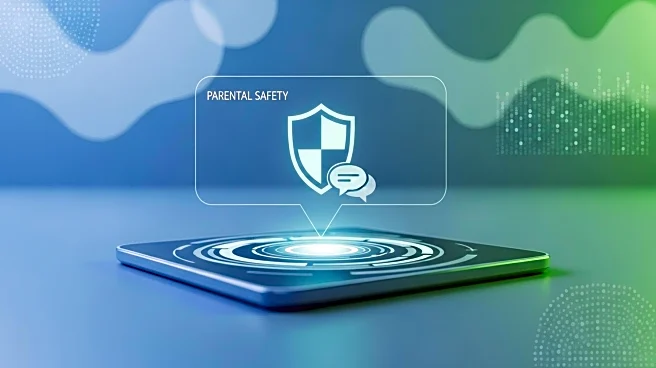What's Happening?
OpenAI has launched new safety tools for ChatGPT aimed at parents of teenagers, aged 13 to 18, to enhance their children's online safety. This update allows parents and law enforcement to receive notifications if a teen engages in conversations about self-harm or suicide. The move comes as OpenAI faces a lawsuit from parents who claim ChatGPT contributed to their child's death by allegedly encouraging harmful behavior. The new system alters the content experience for teens, adding protections against graphic content and inappropriate roleplay. If a teen enters a prompt related to self-harm, it is reviewed by a team who may notify parents. Notifications are sent via text, email, or app alerts, though there may be delays in delivery. OpenAI is working to reduce this lag time. The notifications will not include direct quotes from the conversations but will provide parents with strategies from mental health experts.
Why It's Important?
The introduction of these safety measures by OpenAI is significant as it addresses growing concerns about the influence of AI chatbots on young users. By implementing these controls, OpenAI aims to mitigate risks associated with harmful content and provide parents with tools to protect their children. This development highlights the ongoing debate about the responsibility of tech companies in safeguarding vulnerable users, particularly minors. The potential impact on public policy and tech industry standards is considerable, as it may prompt other companies to adopt similar measures. Parents and guardians stand to benefit from increased oversight, while OpenAI seeks to balance user privacy with safety. The effectiveness of these measures will be closely watched by stakeholders, including policymakers and child safety advocates.
What's Next?
OpenAI plans to continue refining the notification system to minimize delays, ensuring parents receive timely alerts. The company may also explore further collaborations with mental health experts to enhance the support provided to families. As the system is rolled out globally, OpenAI will need to navigate varying legal and cultural contexts, particularly in coordinating with law enforcement. The tech industry and regulatory bodies will likely monitor the implementation and effectiveness of these safety features, potentially influencing future regulations and industry practices.
Beyond the Headlines
This development raises ethical questions about the balance between user privacy and safety, especially for minors. The decision to notify parents without revealing specific conversation details aims to protect teen privacy while ensuring safety. However, the reliance on human moderators and potential law enforcement involvement introduces complexities in terms of data privacy and international legal compliance. The broader implications for AI ethics and the role of technology in mental health support are significant, as society grapples with the integration of AI in everyday life.










